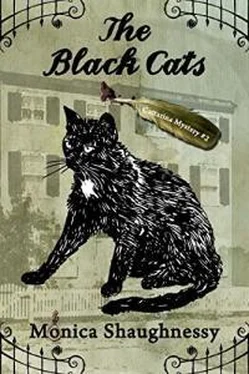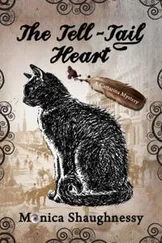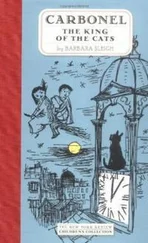Eddy lifted the window sash, and I settled onto his desk to supervise the preparations. Two pens he owned: one of common goose, which he used for hasty notes, the other of crow, which he used for manuscripts, official correspondence, and so forth. The crow offered a finer point that made writing in a small, neat hand easier. As expected, he plucked the black quill from its wire holder, withdrew his penknife from his pocket, and shaved the nib to his liking. The scraping lulled me into a purr. Once he’d prepared the instrument, he uncorked the ink, a blackish-brownish liquid that smelled of rust, and laid out a clean piece of paper, cut the day before from a long scroll. The day’s writing could begin.
He dipped his pen and drew marks across the top of the page. “‘The Black Cat,’” he said. “An obvious title but a fitting one, eh, Catters?”
I hopped on his shoulder and surveyed the work. The scrawl looked like a dribbling of weak tea now but would soon dry to a strong, fine brown—the color of Eddy’s hair. I meowed with approval and resumed my spot on the desk. He stroked my back then sat forward to write, completing several lines before stopping again. “Listen, Catters, and tell me if I have captured the requisite voice.” He took up the paper and read aloud: “For the most wild, yet most homely narrative which I am about to pen, I neither expect nor solicit belief. Mad indeed would I be to expect it, in a case where my very senses reject their own evidence. Yet, mad am I not—and very surely do I not dream.”
I stretched and yawned, curling my tongue. Life was much too comfortable to pursue a man who made sausage of cats. Although something about the challenge piqued my curiosity. I wondered if I had enough stamina to chase such a villain. Alas, I’d regained some—not all—of the weight I’d lost last fall. Blasted pot roast dinners. It was almost as if Muddy wanted me to eat them, the way she left them on the sideboard time and again. I rolled on my back, exposing my ample mid-section. Eddy tickled my stomach with his quill, and I batted the feather more out of obligation than interest. I shut my eyes and waited for the pleasant scratch of goose nib on paper once again.
Some period afterward, light played across my eyelids. I awoke to find Eddy slumped in his chair, the penknife—not the quill—between his fingers. He turned the sharp object, catching a ray of sun with the blade. Any other day, his fascination with the knife would have raised little concern. Today, however, was not any other day, not with a one-eyed cat planted in the garden.
“What would possess a man, Cattarina? What?” He looked at me with pained expression. “I could not fathom it, unless…” He placed the penknife in a leather case that he tucked in his jacket pocket. “Come, Catters. Jolley Spirits awaits.”
I accompanied him out of concern, for I did not like Mr. Jolley, nor did I like the effect of Mr. Jolley’s spirits on my companion. They dulled my companion’s wits, a fact apparent to everyone but him. We descended the steps and entered the kitchen where he cobbled together bread, cheese, and ham pulled from the cooling cabinet. He finished by heaping the concoction with a generous portion of mustard and sour pickle.
Sissy poked her head into the room, embroidery hoop in hand. “I see you have an appetite, my love.”
“I have a great thirst as well.”
“For water?”
Eddy chuckled.
“For words?”
Eddy did not answer. He wrapped his sandwich in a kitchen cloth, folding and tying it with great consideration. From the attention he gave the bundle, I would have thought it no less important than a manuscript.
Sissy’s gaze fell to the floor. “When will you be back?”
Eddy tied the top of the cloth and headed for the back door. “Before dinner. I swear it.” He held up his hand in oath. “Catters will keep me out of trouble. Do not worry.”
Sissy regarded me, her jaw clenched. This winter, I had become not just her nursemaid but also his. Like the morning glory vines in the back garden, Eddy and Sissy’s woes grew in tangles, each pulling the other down, until the couple’s fate became inseparably entwined: the sicker Sissy grew, the more broken Eddy became; the more broken Eddy became, the sicker Sissy grew. It was enough to drive a cat mad.
“Very well,” she said. “If you must.”
***
Eddy and I arrived at Jolley Spirits, a tavern on Spring Garden. Trimmed by a ripped awning, the single-story eyesore sat amongst newer, taller edifices, and had—of all things—a stable out back. The interior was no less squalid. We took our usual table near the window. The air smelled faintly of horse dung, a scent I attributed to someone’s boots. From the crumb-covered tabletop, I assessed the crowd. Men with sooty faces—rowdies from the rail depot—had gathered around the bar. They shouted and slapped one another’s backs in a manner most aggressive, disturbing a table of dark-suited gentlemen in the back. Despite occasional jeers from both sides, spirits flowed, and a war between the camps seemed unlikely. I thought about starting one later for my own amusement.
Eddy untied his kitchen bundle. “Sissy worries about me, Catters,” he said in a low voice. “But it is I who should do the worrying, don’t you think?” He lifted the sandwich to take a bite. “Virginia was so…despondent when we left and over a trivial matter.” His face soured. “Curses, I have lost my appetite again.” He shrouded his lunch with the cloth, laying it to rest. “I am certain it is ‘The Black Cat.’”
I recognized these words from our writing session. Had he been referring to this morning’s feline? Or his story? I couldn’t be sure. Either way, I was glad the tom’s death still occupied his mind because it had yet to leave mine. I thought about the killer—the Butcher of Green Street—while I groomed my haunches.
“At any rate, I cannot seem to—” Eddy stopped mid-sentence when Mr. Jolley, the barkeep, arrived with a glass of port wine.
“How is my best customer?” Mr. Jolley asked. A hideous old man with fewer teeth than fingers, he’d outlived most humans. He set the drink before Eddy and reached for me with a spotted hand. Blue veins bulged beneath his thinning skin. I flattened my ears and growled, letting the pitch rise to match my agitation. He heeded the warning and withdrew. Common sense may have been his lone attribute. “Your cat is most peculiar, Mr. Poe,” he said.
Eddy slid a coin across the table then took a draught of wine before speaking. “Peculiar, yes. Most peculiar? Good sir, you have not met my mother-in-law.”
Mr. Jolley chuckled, dabbing the corner of his mouth with his sleeve. His dark suit smelled of cedar and dust. “I have seen Maria Clemm on the street, and she is a fetching woman.”
“She is rather good at retrieving,” Eddy said.
Mr. Jolley’s chuckle turned into a belly laugh. “Oh, Mr. Poe, I beg you! Stop at once!”
“It is all in jest,” Eddy said. “I could not do without dear Muddy. She is my salvation.” He finished his wine and set the glass down with finality.
He pointed to the empty vessel. “Another?”
Eddy hesitated.
“How is your magazine coming?”
“No longer the Penn , it is the Stylus , revived and restyled under better auspices. And while the Pioneer and others like it have collapsed, the Stylus is in capable hands.”
“Is that right?” Mr. Jolley held onto the back of a nearby chair. “I read Mr. Clark withdrew his support. Unless the Saturday Museum prints lies these days.”
Eddy shifted in his seat.
“Let me get that refill,” Mr. Jolley said, hobbling away. “Good afternoon, Mr. Arnold!” he shouted to a departing patron. “Give my best to Tabitha!”
Читать дальше












